|

|

|

|

|

|
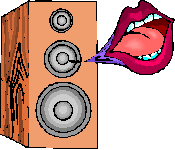 |

|

|
| THE
ENGLISH LEARNING WEBSITE |
VOCABULARY
EXERCISES |
GRAMMAR
EXERCISES |
GRAMMAR
REFERENCE |
TEXTBOOKS |
SONGS |
TEACHERS |
LINKS |

 grammar
reference
grammar
reference
Choose a topic from the list:
Personal
subject and object pronouns
Personal subject pronouns
Personal subject pronouns always go BEFORE a verb. They
represent the subject.
Examples:
I am a
doctor. You
work a
lot. He is
happy. She is Mary. It is
broken. We like
films. You study
English. They are
looking
at John.
 I I
 you
you
 he he
 she she
 it
it  it it |
 we we
 you you
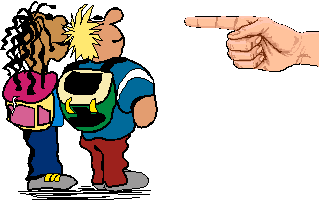 they
they
  they they
   they
they
|
Personal object pronouns
Personal object pronouns
always go AFTER a verb.
They represent the object.
Examples:
Marta
loves
me. Peter likes
you. We know
him. I
phoned
her. I don't like
it. Are you calling
us?. I can't
you.
I
seevisit
them.
They also go AFTER a preposition.
Examples:
Please
come with
me. I am looking for
him. He's looking at
her.
 me me
 you
you
 him him
 her her
 it
it  it it
|
 us us
 you
you
 them them
  them them
   them
them |
Possessive
pronouns and adjectives
Possessive adjectives
Possessive adjectives usually ACCOMPANY a noun, and they
indicate possession.
Examples:
This is my friend.
This is your
dog (=you have got a
dog). This is his
bag (=he has got a bag). He is her brother
(=she has got a brother). This is our friend
(=we have got a
friend). This is your
picture (=you have got a picture). She is their
cousin (=they have got a cousin).
NOTE that possessive adjectives never end in -s in the plural. Example:
These are mys friends. These are my
friends. These are my friends.
friends.
 my my
 your
your
 his his
 her her
 its its
 its its
|
 our our
 your
your
 their their
  their their
   their
their |
Possessive pronouns
Possessive
pronouns usually SUBSTITUTE a possessive adjective + noun.
Examples:
This car is mine. =
This car is my
car.
My car is bigger than yours.
= My
car is bigger than your
car.
I like my house, but I
don't like theirs.
= I don't like their
house.
 mine mine
 yours
yours
 his his
 hers hers
 its its
 its its
|
 ours ours
 yours
yours
 theirs theirs
  theirs theirs
   theirs
theirs |
The plural
FORMATION
OF THE PLURAL
In
general, we add
"-s":
For
example:
 one
book
one
book  two books
two books

 one
apple
one
apple 
 two
apples
two
apples
 one
boy
one
boy 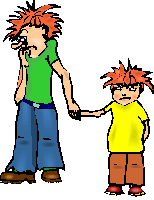 two
boys
two
boys
SPECIAL
CASES:
We
add "-es":
* With
nouns ending in -s:
 one
bus
one
bus 
 two
buses
two
buses
* With
nouns ending in -sh:
 one
brush
one
brush 
 two brushes
two brushes
* With
nouns ending in -ch:
 one
church
one
church 
 two churches
two churches
* With
nouns ending in -x:
 one
box
one
box 
 two boxes
two boxes
* With
nouns ending in -o:
 one
tomato
one
tomato 
 two tomatoes
two tomatoes
We
add "-ies"
With
nouns ending in consonant + -y
(and we remove the "-y"):
 one
baby
one
baby 
 two babies
two babies
Nouns
ending in
"-f" or "-fe" change "-f" into "-v" and
add "-es"
 one
wolf
one
wolf 
 two wolves
two wolves
 one
knife
one
knife 
 two knives
two knives
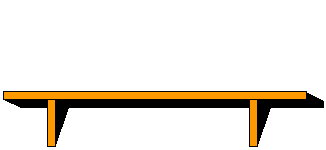 one
shelf
one
shelf 
 two shelves
two shelves
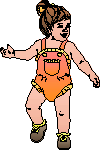 one
life
one
life

 two lives
two lives
 one
housewife
one
housewife 
 two housewives
two housewives
IRREGULAR
PLURALS (nouns that do not admit +"-s"
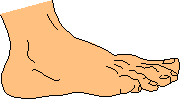 one
foot
one
foot 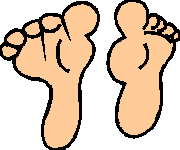 two feet
two feet
 one
tooth
one
tooth  a lot of teeth
a lot of teeth
 one
woman
one
woman 
 two women
two women
 one
man
one
man 
 two men
two men
 one
child
one
child  two children
two children
 one
person
one
person
 a lot of people
a lot of people
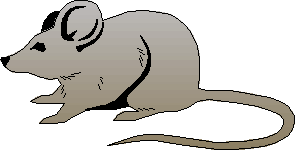 one
mouse
one
mouse

 two mice
two mice
 one
goose
one
goose 
 two
geese
two
geese
 one
louse
one
louse 
 two
lice
two
lice
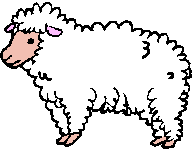 one
sheep
one
sheep

 two sheep
two sheep
 one
fish
one
fish

 two
fish
two
fish
a
/ an, some, any
|
AFFIRMATIVE
SENTENCES
|
|
|
countable
|
uncountable
|
|
singular
|
a
/ an
|
some
|
|
plural
|
some
|
|
|
NEGATIVE
AND INTERROGATIVE SENTENCES
|
|
|
countable
|
uncountable
|
|
singular
|
a
/ an
|
any
|
|
plural
|
any
|
|
Countable nouns are nouns that can be accompanied by a
number. Countable nouns can be counted. For example: a glass, an apple, five
euros, twenty people, three cars, six hours, two chairs.
Uncountable nouns cannot be accompanied by a number. They
cannot be counted. They usually refer to abstract qualities, liquids, materials,
collections, etc. For examle: love, water, plastic, food, fruit,
rubbish, money, electricity, time, furniture.
 A presentation: Countable or
uncountable?
A presentation: Countable or
uncountable?
● We use
a or an with
countable singular nouns, in
affirmative, negative or interrogative sentences.
a
+ word with consonant  There is an
apple. There
isn't an
egg. Is there an orange?
There is an
apple. There
isn't an
egg. Is there an orange?
I have got an apple. Do you want an apple?
an
+ word with
vowel  There is a pear. There
isn't a melon. Is
there a tomato?
There is a pear. There
isn't a melon. Is
there a tomato?
● We use
some in affirmative
sentences with plural
nouns, and with uncountable
nouns (always singular). Some means "more than one". It doesn't
indicate quantity.
 There are some books on
the shelf.
There are some books on
the shelf.  There is some food in the basket.
There is some food in the basket.
● We use
any in negative
or interrogative sentences with plural
nouns, and with uncountable
nouns (always singular).
 There aren't any books on the
shelf. Are there any books on the shelf?
There aren't any books on the
shelf. Are there any books on the shelf?
 There isn't any food in the
basket. Is there any food in the basket?
There isn't any food in the
basket. Is there any food in the basket?
Comparison:
the comparative and the superlative
Comparative and superlative:
use AND EXAMPLES
We
use the COMPARATIVE when we
compare two things or people.
For
example:

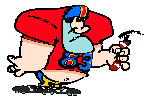

Pau
Trevor Robert
Pau is taller than Trevor.
Trevor is taller than Robert.
Robert is shorter than Trevor.
Robert is more famous than Trevor.



Jane
Pat
Bertha
Jane is more beautiful than Pat.
Pat is more beautiful than Bertha.
Pat is uglier than Jane.
We use the SUPERLATIVE when we
compare one thing or person with two or more things or people.
For example:



Pau
Trevor
Robert
Pau is the tallest (of the
three).
Robert is the shortest (of the three).
Pau
is the best and the most famous basketball player in the world.



Jane
Pat
Bertha
Jane is the most beautiful (of the
three).
Jane
is the most beautiful actress in our country.
Bertha is the ugliest (of the three).
The comparative: form
We use the comparative when we
compare two things or people. We use the particle than to
introduce the second element.
For example:
Pau (element
1) is
taller than Trevor (element 2).
There are two ways of
putting and adjective
into the comparative form, depending on the adjective.
a) With short adjectives,
we add -er
to the adjective.
Short
adjectives have got one or two syllables. For example:
clean -> cleaner
long -> longer
short -> shorter
fast -> faster
Attention:
with adjectives ending in -e we add only -r. For example:
nice -> nicer
safe -> safer
Attention:
with adjectives ending in -y we take away the -y and add -ier.
For example:
happy -> happier
easy -> easier
scary -> scarier
Attention:
with adjectives ending in consonant + vowel + consonant we double the
last consonant.
For example:
big -> bigger
fat -> fatter
thin -> thinner
Attention:
some adjectives have irregular forms. For example:
good -> better
bad -> worse
far -> farther / further
b) With long adjectives,
we add
"more"
in front of the adjective.
Long
adjectives have got two or more syllables. For example:
beautiful -> more beautiful
important -> more important
boring -> more boring
famous -> more famous
The superlative: form
We use the superlative when we
compare one thing or person with two or more things or people. We
use the particle the to introduce the adjective.
For example:
Pau is the most famous player in the world.
There are two ways of
putting and adjective
into the superlative form, depending on the adjective.
a) With short adjectives,
we add -est
to the adjective.
Short
adjectives have got one or two syllables. For example:
clean -> cleanest
long -> longest
short -> shortest
fast -> fastest
Attention:
with adjectives ending in -e we add only -st. For example:
nice -> nicest
safe -> safest
Attention:
with adjectives ending in -y we take away the -y and add -iest.
For example:
happy -> happiest
easy -> easiest
scary -> scariest
Attention:
with adjectives ending in consonant + vowel + consonant we double the
last consonant.
For example:
big -> biggest
fat -> fattest
thin -> thinnest
Attention:
some adjectives have irregular forms. For example:
good -> best
bad -> worst
far -> farthest / furthest
b) With long
adjectives, we add
"most"
in front of the adjective.
Long
adjectives have got two or more syllables. For example:
beautiful -> most beautiful
important -> most important
boring -> most boring
famous -> most famous
SUMMARY
OF THE COMPARATIVE AND SUPERLATIVE
(WITH EXAMPLES)
| |
COMPARATIVE
we compare two things
Particle: than |
SUPERLATIVE
we compare one thing with two or more
Particle: the |
|
short adjectives |
shorter than
smaller than
bigger than
easier than |
the shortest
the smallest
the biggest
the easiest |
|
long adjectives |
more comfortable than
more
intelligent than
more
dangerous than |
the most comfortable
the
most intelligent
the
most dangerous |
|
irregular adjectives
good, bad, far |
better than
worse than
farther than /
further than |
the
best
the
worst
the
farthest / the
furthest |
Equality and unequality
To express equality, that two things are
similar, we use a different
construction:
as + adjective + as
To express unequality, that two things are different, not similar, we
use this construction with a negative verb.
For example:


150
euros
= 150 euros
The ring is as expensive as the
watch. (EQUALITY)
The
ring isn't as useful as the watch. (UNEQUALITY)
The
present simple
The present simple: the verb to
be
AFFIRMATIVE
I am / I'm
you are / you're
he is / he's
she is / she's
it is / it's
we are / we're
you are / you're
they are / they're
|
NEGATIVE
I am not / I'm not
you are not / you
aren't
he is not / he isn't
she is not / she
isn't
it is not / it isn't
we are not / we
aren't
you are not / you
aren't
they are not / they aren't
|
INTERROGATIVE
Am I?
Are you?
Is he?
Is she?
Is it?
Are we?
Are you?
Are they?
|
Use of the verb to be in the
present simple
We use the verb be
to describe the appearance
or the feelings
or of people or things:
 He is
tall.
He is
tall.
 He is happy.
He is happy.
We use the verb be
to express a permanent or a temporary state of
people or things:
 It
is dark.
It
is dark. 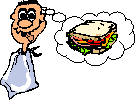 I
am hungry.
I
am hungry.
We use the verb be
to express a job:
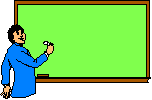 He is a teacher.
He is a teacher.
We use the verb be
to describe where
people are:
 They are at school.
They are at school.
We use the verb be
to express the age
of a person:
 She is two years old.
She is two years old.
We use the verb be
to describe the weather:
 The
weather is cold in the winter.
The
weather is cold in the winter.  It
is warm and sunny today.
It
is warm and sunny today.
The
present simple: the verb have
got
Affirmative
I have got / I've
got
you have got /
you've got
he has got / he's
got
she has got / she's
got
it has got / it's
got
we have got / we've
got
you have got /
you've got
they have got / they've got
|
Negative
I haven't got
you haven't got
he hasn't got
she hasn't got
it hasn't got
we haven't got
you haven't got
they haven't got
|
Interrogative
Have I got?
Have you got?
Has he got?
Has she got?
Has it got?
Have we got?
Have you got?
Have they got?
|
Use of the verb have got in the
present simple
We use the verb have got to speak about possessions in
the present.
 She
has got long hair.
She
has got long hair.  She hasn't got long hair.
She hasn't got long hair.
 They
have got presents.
They
have got presents.
 He hasn't got a guitar.
He hasn't got a guitar.
The
present simple
affirmative
Subject + verb (+ s / es)
I work
you work
he works *
she works *
it works *
we work
you work
they work
|
Negative
Subject + do(es)n't +
infinitive
I don't work
you don't work
he doesn't
work
she doesn't
work
it doesn't
work
we don't work
you don't work
they don't work
|
Interrogative
Do(es) + subject +
infinitive
Do I work?
Do you work?
Does he
work?
Does she
work?
Does it
work?
Do we work?
Do you work?
Do they work?
|
*
Spelling
We add -es
and not -s
to the verb with:
a) Verbs ending in -ch, -sh,
-ss, -x
Examples: She watches TV. She
washes
the car. He misses
his friend. He fixes
the radio.
b) Verbs ending in -o
Examples:
He does the homework.
She goes to the cinema.
c) Verbs ending in consonant + -y
Examples: He studies
English. She carries a bag. (!But not:
She plays the piano.)
| verb |
affirmative |
negative |
interrogative |
| play |
play / plays |
don't play /
doesn't play |
do ... play / does
... play |
| study |
study / studies |
don't study /
doesn't study |
do ... study / does
... study |
| listen |
listen / listens |
don't listen /
doesn't listen |
do ... listen /
does ... listen |
| work |
work / works |
don't work /
doesn't work |
do ... work / does
... work |
| ask |
ask / asks |
don't ask / doesn't
ask |
do ... ask / does
... ask |
| travel |
travel / travels |
don't travel /
doesn't travel |
do ... travel /
does ... travel |
| finish |
finish / finishes |
don't finish /
doesn't finish |
do ... finish /
does ... finish |
| catch |
catch / catches |
don't catch /
doesn't catch |
do ... catch / does
... catch |
| pass |
pass / passes |
don't pass /
doesn't pass |
do ... pass / does
... pass |
| fax |
fax / faxes |
don't fax / doesn't
fax |
do ... fax / does
... fax |
| enjoy |
enjoy / enjoys |
don't enjoy /
doesn't enjoy |
do ... enjoy / does
... enjoy |
Use
of the present simple
See: Present simple or present
continuous?
Adverbs
of frequency and time expressions
adverbs
of frequency
|
100% |
always |
| |
usually, normally,
generally |
| |
frequently,
regularly |
| |
often |
| 50% |
sometimes |
| |
occasionally |
| |
rarely,
infrequently |
| |
seldom |
| |
hardly ever,
almost never |
| 0% |
never |
These
words have a
special position in the sentence: Just
before
the verb, except with the verbs be,
can and other modal verbs.
Examples:
I always
watch TV. She usually washes the car. We sometimes go to the
cinema. They rarely go to a restaurant. I never smoke. She is often
at home. She can sometimes help me.
TIME
EXPRESSIONS
Other time expressions used with the Present simple are for example:
every day, every week, every month, every year, every summer, in the morning, in the summer, after school,
once a week, twice a month, three times a year,
Time expressions in general have a special position in the sentence: at
the
beginning or at the end.
Examples:
He watches TV every day. He goes to the
cinema every evening.
She studies English once a week. She travels
to London twice a year.
She phones her family on Sundays.
The present continuous
AFFIRMATIVE
Subject
+ am / are / is + verb+-ing
I am working
you are working
he is working
she is working
it is working
we are working
you are working
they are working
|
NEGATIVE
Subject
+ am not / aren't / isn't + verb+-ing
I am not
working
you aren't working
he isn't working
she isn't working
it isn't working
we aren't working
you aren't working
they aren't working
|
INTERROGATIVE
am /
are / is + Subject + verb+-ing
am I
working?
are you
working?
is he
working?
is she
working?
is it
working?
we working?
are you
working?
are they
working?
|
*
SPELLING: verb + -ing
a) Verbs ending
in -e
-> -e disappears
dance
->
dancing; come -> coming; write ->
writing
b) Doubling of
consonants:
with verbs ending in [1
consonant + 1 vowel + 1 consonant] and
b1) end in -l
(only in British English)
travel ->
travelling; cancel
-> cancelling (in British English only)
b2) have 1 syllable
swim ->
swimming; run -> running; put ->
putting
b3) have 2 syllables, and the stress is on the last syllable
prefer ->
preferring; begin -> beginning; admit
->
admitting
c) Verbs ending
in -ie
-> -ying
die
-> dying;
lie -> lying
NOTE: play ->
playing; study ->
studying; carry -> carrying; buy ->
buying
TIME
EXPRESSIONS
Time expressions used with the present continuous are for
example:
now, right now, at the moment, today
As with time expressions in general, they are usually at the
beginning or at the end of the sentence.
Examples:
He is watching TV
now. I am
reading the newspaper right now. We aren't playing at
the moment.
USE
OF THE pRESENT cONTINUOUS
See: Present
Simple or Present Continuous?
Present simple or present
continuous?
Use of the present simple
We use the present simple to:
a) talk about actions
that occur with regularity, to talk about habits.
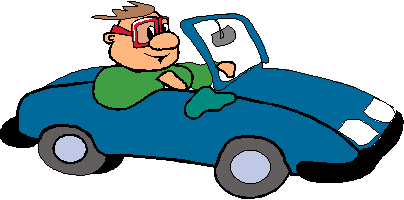 I
don't usually walk to work.
I usually drive my car
to work.
I
don't usually walk to work.
I usually drive my car
to work.
b) talk about permanent
situations
 I
live in a big city.
I
live in a big city.
c) express our opinions,
likes, etc.
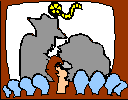 I
like the cinema.
I
like the cinema.
 I
don't like
vegetables.
I
don't like
vegetables.
d) talk about general
facts.
 The sun rises in the East.
The sun rises in the East.
e) talk about some future actions.
See: Expressing the future
Use of the present
continuous
We use the present continuous:
a) to talk
about actions that are happening
at the moment of speaking.
 He is drinking (now).
He is drinking (now).
b) to talk about actions that are happening about this time,
but not necessarily at the moment of speaking
 She
is writing an important scientific article.
She
is writing an important scientific article.
c) to talk about temporary,
not permanent or usual, actions.
 She usually drives to work, but
today she's going by bus.
(She's not on the bus
right now. We are expressing an exception to her habit.)
She usually drives to work, but
today she's going by bus.
(She's not on the bus
right now. We are expressing an exception to her habit.)
 Our friend John is living with
us this month.
(He does not live with
us, it is only for this month.)
Our friend John is living with
us this month.
(He does not live with
us, it is only for this month.)
d) to talk about some future actions.
See: Expressing the future
Compare:
 He is a teacher.
-Does he
correct exams? -Yes, he does. He corrects
exams
because this is part of his job.
We use the Present Simple for
habits.
-Is
he correcting exams? -No, he isn't. He is teaching a
lesson.
He is a teacher.
-Does he
correct exams? -Yes, he does. He corrects
exams
because this is part of his job.
We use the Present Simple for
habits.
-Is
he correcting exams? -No, he isn't. He is teaching a
lesson.
We use the Present Continuous for actions
happening now.
 He is a baker.
-Does
he make bread? -Yes, he does. -Is he making bread? -Yes, he
is.
-Does he make cakes? -Yes, he does. -Is he making a cake?
-No, he isn't.
-Does he make shoes? -No, he doesn't.
He is a baker.
-Does
he make bread? -Yes, he does. -Is he making bread? -Yes, he
is.
-Does he make cakes? -Yes, he does. -Is he making a cake?
-No, he isn't.
-Does he make shoes? -No, he doesn't.
Compare also:
every day
today 

I usually ride my
bicycle to school, (-> habit: Present
Simple)
but today I am walking,
because my bicycle is broken.
(-> no habit: Pres. Continuous)
verbs
not used in the continuous form
Some verbs
don't express actions. They express feelings, mental processes, etc.
Feelings and mental processes are not deliberate actions. These verbs
are not used in the continuous form.
These verbs are:
a) Verbs of the senses
feel, hear, see, smell, taste, sound
 Mmm,
this rose smells very nice.
Mmm,
this rose smells very nice.
b) Verbs of feeling and emotions
like, dislike, love, hate, enjoy, want
 I'm very hungry. I want to eat.
I'm very hungry. I want to eat.
 I don't like vegetables.
I don't like vegetables.
c) Verbs of mental activity
remember, understand, believe, know, forget, guess, think
 Now
I understand the problem!
Now
I understand the problem!
d) The verb have when it is a
synonym of "possess".
 He
has a lot of money.
He
has a lot of money.
(But not when it is part of expressions like: have breakfast, have lunch, have
dinner, have a shower, have a bath...)
 He
is having a bath.
He
is having a bath.
e) Prices and measures.
cost, measure, weigh
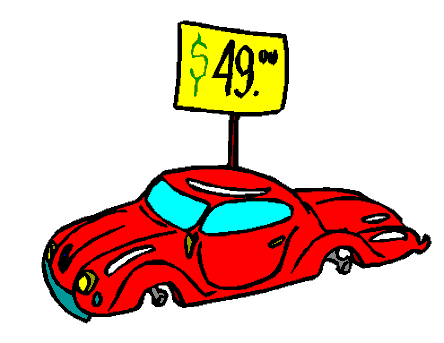
The car costs £
49.
there
is / there are, there was / there were
in the present
We
use there
is or there are
to talk about the existence of
things or persons.
There
is +
singular
There are +
plural
In
Spanish, there
is and there are mean
"HAY".
 There
is one apple.
There
is one apple.
 There
is a woman.
There
is a woman.
 There is some tea.
There is some tea.

 There are two apples.
There are two apples.
 There
are a lot of people.
There
are a lot of people.
In the past
We use there
was or there
wereto talk about the existence of
things or persons.
There
was +
singular
There were
+
plural
 There
was an accident yesterday.
There
was an accident yesterday.
 There
was a woman.
There
was a woman.
 There
was some tea.
There
was some tea.

 There were two apples.
There were two apples.
 There were a lot of people.
There were a lot of people.
The
past simple
AFFIRMATIVE
Subject
+ verb+-ed
/2nd column
REGULAR
IRREGULAR
you worked
you went
he worked
he went
she worked
she went
it worked
it went
we worked
we went
you worked
you went
they worked
they went
|
NEGATIVE
Subject
+ didn't +
infinitive
REGULAR
IRREGULAR
I
didn't
work
I didn't go
you
didn't work
you didn't go
he
didn't work
he didn't go
she
didn't work
she didn't go
it
didn't work
it didn't go
we
didn't work
we didn't go
you
didn't work
you didn't go
they
didn't work
they didn't go
|
INTERROGATIVE
Did +
subject + infinitive
REGULAR
IRREGULAR
Did I work?
Did
I go?
Did you work?
Did
you go?
Did he work?
Did
he go?
Did she work?
Did
she go?
Did it work?
Did
it go?
Did we work?
Did
we go?
Did you work?
Did
you go?
Did they work?
Did they go?
|
*
Spelling: verb + -ed
a) Verbs ending
in -e
-> -e
disappears
dance ->
danced; love -> loved; like -> liked;
die -> died
b) Doubling of
consonants:
with verbs ending in [1
consonant + 1 vowel + 1 consonant] and
b1) end in -l
(only in British English, but not in American English)
travel -> travelled; cancel ->
cancelled (in British English only)
b2) have 1 syllable
stop ->
stopped; plan -> planned; chat -> chatted
b3) have 2 syllables, and the stress is on the last syllable
prefer ->
preferred; admit -> admitted (because we
pronounce: pre'fer, ad'mit)
! but not: answer
-> answered; visit -> visited; listen ->
listened
(because we pronounce: 'answer)
c) Verbs ending
in consonant + -y ->
consonant + ied
study ->
studied; carry -> carried
! but not: play -> played; stay ->
stayed; enjoy -> enjoyed
Irregular verbs list
To express the past, we add -ed
to the end of a verb. But some verbs do not admit -ed.
Those verbs are for example: go,
be, come, drink, eat,... They are
irregular verbs. Irregular verbs follow no rules, you must learn them
from a list.
Here are some examples:
go -> goed
went
drink -> drinked
drank
eat -> eated
ate
be -> bed
was / were*
* The verb be in the past follows
different
rules. (see it here)
Click here to see a list of
irregular verbs with Spanish translation.
Use of the past simple
We use the Past Simple
a) to talk about actions
that happened in the past. They started and finished in the past.
 Shakespeare was a
writer. He was born in England in 1564. He wrote a lot of theatre
plays and poems. He died in 1616. He was a contemporary of
Cervantes, but most probably he didn't know him or his writings.
Shakespeare was a
writer. He was born in England in 1564. He wrote a lot of theatre
plays and poems. He died in 1616. He was a contemporary of
Cervantes, but most probably he didn't know him or his writings.
b) to talk about past habits
 We often went to the beach.
We often went to the beach.
TIME
EXPRESSIONS
Some expressions that can be used with a past simple verb are for
example:
yesterday,
the day before yesterday
last night, last
week, last weekend, last month, last summer, last year, an hour ago,
two
months ago, in 1990
As with time expressions in general, they are usually at the
beginning or at the end of the sentence.
Examples:
He watched TV last
Sunday. He went to the
cinema last night. She studied English two
years ago. She
travelled to London in 2003.
The
past simple: to be
AFFIRMATIVE
I was
you were
he was
she was
it was
we were
you were
they were
|
NEGATIVE
I was not / I
wasn't
you were not / you weren't
he was not / he wasn't
she was not / she wasn't
it was not / it wasn't
we were not / we weren't
you were not / you weren't
they were not / they weren't
|
INTERROGATIVE
Was I?
Were you?
Was he?
Was she?
Was it?
Were we?
Were you?
Were they?
|
used
to
AFFIRMATIVE
I used to + verb
you used
to + verb
he used
to + verb
she used
to + verb
it used
to + verb
we used
to + verb
you used
to + verb
they
used to + verb
|
NEGATIVE
I didn't use to +
verb
you
didn't use to +
verb
he didn't
use to +
verb
she
didn't use to +
verb
it didn't
use to +
verb
we didn't
use to +
verb
you
didn't use to +
verb
they didn't use to + verb
|
INTERROGATIVE
Did
I use to + verb?
Did
you use to +
verb?
Did
he use to +
verb?
Did
she use to +
verb?
Did
it use to +
verb?
Did
we use to +
verb?
Did
you use to +
verb?
Did they use to + verb?
|
Use
of the expression used
to + verb
We use the used to
+ an infinitive
verb to talk about past habits. We want to express that the action
happened
regularly in the past.
I used to walk to
school.
When I was a child, I
used to play football very well.
When she was young she
used to have long hair.
There is a contrast with the present:
 When
I was a child, I
used to have long hair.
When
I was a child, I
used to have long hair.
This means that
I NO LONGER have long hair at present. "Used to" implies that the
present is different to the past. (I had long hair when I was a child,
but now
I have short hair.)
The
Past Continuous
AFFIRMATIVE
Subject + was / were + verb+-ing
I was working
you were working
he was working
she was working
it was working
we were working
you were working
they were working
|
NEGATIVE
Subject + wasn't / weren't + verb+-ing
I wasn't working
you weren't working
he wasn't
working
she wasn't
working
it wasn't working
we wasn't working
you wasn't working
they wasn't working
|
INTERROGATIVE
was / were + Subject + verb+-ing
was I working?
were you working?
was he working?
was she working?
was it working?
were we working?
were you working?
were you working? |
SPELLING: verb + -ing
a) Verbs ending
in -e
-> -e disappears
dance ->
dancing; come -> coming; write ->
writing
b) Doubling of
consonants:
with verbs ending in [1
consonant + 1 vowel + 1 consonant] and
b1) end in -l
(only in British English, not in American English)
travel -> travelling; cancel ->
cancelling (in British English only)
b2) have 1 syllable
swim -> swimming; run -> running; put
-> putting
b3) have 2 syllables, and the stress is on the last syllable
prefer -> preferring; begin ->
beginning; admit ->
admitting
but not: answering,
listening, visiting (because they have the stress on the
first syllable)
c) Verbs ending
in -ie
-> -ying
die
-> dying;
lie -> lying
NOTE: play -> playing; study ->
studying; carry -> carrying; buy ->
buying
Use of the past continuous
We use the Past Continuous to talk
about actions that were in progress in
the past, at a particular moment.
Example:
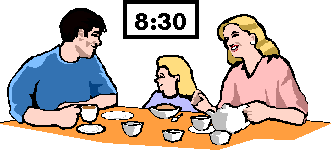 Yesterday at 8.30 they were
having breakfast.
Yesterday at 8.30 they were
having breakfast.
This means that breakfast had started some time before 8:30 and was in
progress or had not finished at 8:30
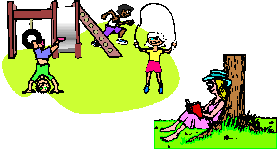 Yesterday while the children
were playing in the park, Sally was reading.
Yesterday while the children
were playing in the park, Sally was reading.
This means that both actions were in progress at the same time and had
approximately the same duration.
TIME
EXPRESSIONS
Time expressions used with a past continuous verb are for example:
yesterday,
the day before yesterday
last night, last
week, last weekend, last month, last summer, last year,
an hour ago, two
months ago, in 1990
We put these expressions at the
beginning or at the end of the sentence.
Examples:
I was watching TV at
three o'clock last Sunday.
I was having a shower
when you phoned last night.
Past simple or past continuous?
When two actions coincided at a particular
moment, the Past
Continuous expresses the
action that had started previously, and was in progress,
when the
other action happened.

 When I was watching TV,
the
telephone rang.
When I was watching TV,
the
telephone rang.
I was watching TV when the telephone rang.

When Peter was driving
his car, he hit a tree.
Peter was driving his
car when he hit a tree.
The present perfect
AFFIRMATIVE
Subject + have / has + participle
REGULAR
IRREGULAR
I have work ed
I have gone
you have
work ed
you have gone
he has work ed
he has gone
she has
work ed
she has gone
it has
work ed
it has gone
we have
work ed
we have gone
you have
work ed
you have gone
they have
work ed
they have gone
|
NEGATIVE
Subject + haven't / hasn't + participle
REGULAR
IRREGULAR
I haven't work ed
I haven't gone
you haven't
work ed
you haven't gone
he hasn't
work ed
he hasn't gone
she hasn't
work ed
she hasn't gone
it hasn't
work ed
it hasn't gone
we haven't
work ed
we haven't gone
you haven't
work ed
you haven't gone
they haven't
work ed
they haven't gone
|
INTERROGATIVE
have / has + subject + participle
REGULAR
IRREGULAR
have I work ed?
have I
gone?
have you work ed?
have you
gone?
has he work ed?
has he
gone?
has she work ed?
has she
gone?
has it work ed?
has it
gone?
have we work ed?
have we
gone?
have you work ed?
have you gone?
have they work ed?
have they worked?
|
the
participle: formation
There are regular verbs and irregular verbs.
In English, we add -ed
to a verb to form the past participle of a regular verb:
work -> worked
*
Spelling: verb + -ed
The spellling rules are like those for the formation of the past simple:
a) Verbs ending
in -e
-> -e
disappears
dance ->
danced; love -> loved; like -> liked;
die -> died
b) Doubling of
consonants:
with verbs ending in [1
consonant + 1 vowel + 1 consonant] and
b1) end in -l
(only in British English, but not in American English)
travel -> travelled;
cancel -> cancelled (in British English only)
b2) have 1 syllable
stop ->
stopped; plan -> planned; chat -> chatted
b3) have 2 syllables, and the stress is on the last syllable
prefer ->
preferred; admit -> admitted (because we
pronounce: pre'fer, ad'mit)
! but not: answer
-> answered; visit -> visited; listen ->
listened
(because we pronounce: 'answer, etc.)
c) Verbs ending
in consonant + -y ->
consonant + ied
study ->
studied; carry -> carried
! but not: play -> played; stay ->
stayed; enjoy -> enjoyed
* Attention: IRREGULAR VERBS
Some verbs do not admit -ed.
Those verbs are for example: go,
be, come, drink, eat,... They are
irregular verbs. Irregular verbs follow no rules, you must learn them
from a list.
Here are some examples:
go -> goed
gone
drink -> drinked
drunk
eat -> eated
eaten
be -> bed
been*
Click here to see a list of
irregular verbs with Spanish translation.
Use of the present perfect
When an action or a situation is expressed in the present perfect,
there is a connexion between the present and the past.
We use the present perfect:
a) to talk
about recent past actions
Compare:
 He is eating an apple (now).
He is eating an apple (now). She
has eaten an
apple.
She
has eaten an
apple.
 She
is climbing
a mountain (now).
She
is climbing
a mountain (now). They
have climbed
a mountain.
They
have climbed
a mountain.
 She
has finished
her work.
She
has finished
her work.
b) recent
actions that have results in the present
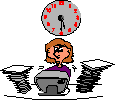 She hasn't finished her
work. (And she's still working.)
She hasn't finished her
work. (And she's still working.)
 Tom
has had an
accident. (And now he has got a
broken leg.)
Tom
has had an
accident. (And now he has got a
broken leg.)
c) to talk
about experiences of a living person
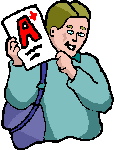 I
have always had good marks.
I
have always had good marks.
 I
have travelled
to many countries.
I
have travelled
to many countries.
NOTE: If a person is dead, we use the
past simple:
 Shakespeare
wrote a lot of plays and poems.
Shakespeare
wrote a lot of plays and poems.
Particles:
never, ever, just, already, yet, since, for
These expressions can be used with the Present Perfect:
NEVER
 He has never played
computer games.
He has never played
computer games.
(Spanish: Él nunca ha
jugado a juegos de ordenador.)
We put never before the participle.
EVER?
 Have you ever visited Rome?
Have you ever visited Rome?
(Spanish: ¿Has visitado Roma alguna
vez?)
Ever means 'at any time in the past'.
We put ever before the
participle.
EVER
 It is the best film I have ever seen.
It is the best film I have ever seen.
(Spanish: Es la mejor película que he visto nunca.)
We use ever with superlatives.
We put ever before the
participle.
(not) EVER
 He hasn't ever walked. = He has never walked.
He hasn't ever walked. = He has never walked.
(not ever) means 'never'.
Never is more usual than not ever.
YET (?)
 Have you made your bed yet?
Have you made your bed yet?
(Spanish: ¿Has hecho ya tu
cama?)
We put yet at the end of
the sentence.
(not) YET
 She hasn't had her baby yet.
She hasn't had her baby yet.
(Spanish: Ella aún no ha tenido a su bebé.)
We put yet at the end of the sentence.
ALREADY
 She has already had her baby.
She has already had her baby.
(Spanish: Ella ya ha tenido a
su bebé.)
We put already before
the participle.
JUST
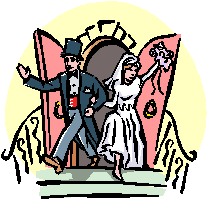 They have just married.
They have just married.
(Spanish: Acaban de casarse.)
Just means 'very recently'.
We put just before the
participle.
FOR
(+ a period of time)
 I haven't seen the dentist for
one year.
I haven't seen the dentist for
one year.
(Spanish: No he ido al dentista desde
hace un año.)
We use for with a period of
time.
Other examples: or one month, for two
hours, for three years, for a long time, for a while
SINCE
(+ a particular moment)
 I
haven't ridden my bicycle since
last month.
I
haven't ridden my bicycle since
last month.
(Spanish: No he ido en bici desde
el mes pasado.)
We use since with a particular
moment. This moment indicates when the action started.
Other examples: since 1997, since
yesterday, since three o'clock, since my birthday, since I was a child
"FOR" or "DURING"?
"For" indicates duration, how
long the action took place.
"During" indicates the
moment when
the action took place.
Examples:
It rained for two hours.
=
It rained from 12 o'clock to 2 o'clock.
-
How long did it rain? - For two hours.
It rained during the
night
=It
rained at some time at night.
-
When did it rain? - During the night.
I lived in Paris for
three months.
-
How long did you live in Paris? - From January to March.
I travelled to Paris
three times during the
summer.
-
When did you travel to Paris? - During the summer.
Present
perfect or past simple?
We use the present perfect to talk about
events and experiences that happened in the past, but we do not specify
when.
We refer to an unfinished period of time.
Compare:
Last
summer I read a very interesting novel.
-> We specify the particular moment
and this moment is over.
We use the Past Simple.
I have
read many interesting novels
in my life.
-> We do not
specify the moment, but refer to an unfinished period of
past time that is still valid today.
We use the Present Perfect.
THE PRESENT PERFECT FOR
SPANISH SPEAKERS
The present perfect is sometimes similar to
Spanish, but sometimes very different. Look at these examples:
a) The present
perfect is similar to
Spanish:
-
When we talk about something recent. (We don't mention the particular
moment.)
I have read
her novel recently. = He leído su novela
recientemente.
-
When we talk about something new. (We don't mention the particular
moment.)
I have bought
a car. = Me he comprado un coche.
-
With ever,
never, already, yet.
Have
you ever visited another country? = ¿Has
visitado otro país
alguna vez?
I
have never seen an elephant. = Nunca he visto
un elefante.
I
have already done my homework. = Ya he hecho mis
deberes.
I
haven't finished my homework yet. = Aún no he
terminado mis deberes.
b) The present
perfect is different from
Spanish:
-
With
just.
I
have just seen Martha. = Acabo de ver a Martha.
-"Llevar
haciendo algo desde (hace) tiempo." (usually with
for
or
since).
In Spanish, a present tense is used:
Vivo
en Valencia desde 2002. / desde hace cuatro años.
¿Cuánto tiempo llevas viviendo en Valencia?
En
esta situación, en español se utiliza un presente de indicativo (
vivo,
llevas) cuando la acción sigue siendo válida en el
presente: ahora vivo
en Valencia, y lo hago desde hace cuatro años.
Aquí no habría una
correspondencia exacta con el inglés, ya que no sería correcto usar un
present simple:
I
live in Valencia for four years,
sino un present perfect:
I have lived in Valencia for
four years.
Tengamos en cuenta que
no sólo estamos hablando del presente, ("vivo en Valencia", sino que
también estamos hablando de los últimos cuatro años. Es decir estamos
hablando
a la vez del pasado reciente y del presente, de dónde vivo ahora y de
dónde he
vivido en los últimos cuatro años. El present perfect inglés es el
tiempo que
se usa para hablar del pasado que incluye el presente. Así:
Vivo en Valencia desde
hace cuatro años. = I have lived in
Valencia for four years.
En
ambas lenguas, se entiende que la acción tienen vigencia ahora, es
decir, que
ahora vivo en Valencia.
En
cambio, observa el siguente ejemplo:
Antes, he vivido en
Madrid, Barcelona y París. = Before that, I lived
in Madrid, Barcelona and Paris.
En
ambas lenguas, se entiende que la acción pertenece al pasado.
Para
introducir la expresión de tiempo que acompañaría al Present Perfect,
se usa
for
o
since,
de la siguiente manera:
for + un
período de tiempo:
for one month, for two hours, for three years, for a long time, for a
while
since + un
momento puntual
e implica "desde ese momento hasta ahora":
since 1997, since yesterday, since last year, since three o'clock,
since my
birthday,
since I was a child, since we met
-
"Hace ... tiempo que no hago algo" . In Spanish, a present tense is
used:
Hace dos meses que no
veo a Juan.
In
English, we use the present perfect.
I haven't seen Juan for two months.
In
English, we can also use It's ... since + Past Simple:
It's two months since I
(last) saw Juan.
Another
example:
Hace mucho tiempo que no voy a la playa.
= I haven't been to the beach for a long time. /
It's a long time
since I (last) went to the beach.
The present perfect continuous
AFFIRMATIVE
Subject + have / has been + verb+ing
I have
been working
you have
been working
he has
been working
she has
been working
it has
been working
we have
been working
you have
been working
they have
been working
|
NEGATIVE
Subject + haven't / hasn't been + verb+ing
I haven't
been working
you haven't
been working
he hasn't
been working
she hasn't
been working
it hasn't
been working
we haven't
been working
you haven't
been working
they haven't
been working
|
INTERROGATIVE
have / has + subject + been + verb+ing
have I been working?
have you been working?
has he been working?
has she been working?
has it been working?
have we been working?
have you been working?
have they been working?
|
Examples:
 I am exhausted because I have been cleaning all day.
I am exhausted because I have been cleaning all day.
 She is fit because she has been working out lately.
She is fit because she has been working out lately.
The
past perfect
AFFIRMATIVE
Subject + had + participle
I had
worked
you had
worked
he had
worked
she had
worked
it had
worked
we had
worked
you had
worked
they had
worked |
NEGATIVE
Subject + hadn't / had not + participle
I hadn't
worked
you hadn't
worked
he hadn't
worked
she hadn't
worked
it hadn't
worked
we hadn't
worked
you hadn't
worked
they hadn't
worked |
INTERROGATIVE
had + subject + participle
had I
worked?
had you
worked?
had he
worked?
had she
worked?
had it
worked?
had we
worked?
had you
worked?
had they
worked? |
the
participle: formation
In English, we add -ed
to a verb to form the past participle:
work -> worked
*
Spelling: verb + -ed
The spellling rules are like those for the formation of the
past simple:
a) Verbs ending
in -e
-> -e
disappears
dance ->
danced; love -> loved; like -> liked;
die -> died
b) Doubling of
consonants:
with verbs ending in [1
consonant + 1 vowel + 1 consonant] and
b1) end in -l
(only in British English, but not in American English)
travel -> travelled; cancel ->
cancelling (in British English only)
b2) have 1 syllable
stop ->
stopped; plan -> planning
b3) have 2 syllables, and the stress is on the last syllable
prefer ->
preferred; admit -> admitted (because we
pronounce: pre'fer, ad'mit)
! but not: answer
-> answered; visit -> visited; listen ->
listened
(because we pronounce: 'answer)
c) Verbs ending
in consonant + -y ->
consonant + ied
study ->
studied; carry -> carried
! but not: play -> played; stay ->
stayed
* ATTENTION:
IRREGULAR VERBS
Some verbs do not admit -ed.
Those verbs are for example: go,
be, come, drink, eat,... They are
irregular verbs. Irregular verbs follow no rules, you must learn them
from a list.
Here are some examples:
go -> goed
gone
drink -> drinked
drunk
eat -> eated
eaten
be -> bed
been*
Click here to see a list of
irregular verbs with Spanish translation.
Use of the past perfect
The Past Perfect refers to a past action
that happened previously
to another past moment or another past action.
See these examples:
 Yesterday
by 12 o'clock I had gone to sleep. (= I went
to sleep before 12 o'clock.)
Yesterday
by 12 o'clock I had gone to sleep. (= I went
to sleep before 12 o'clock.)

 After they had got married, they
travelled to Rome. (= They got
married and then they travelled to Rome.)
After they had got married, they
travelled to Rome. (= They got
married and then they travelled to Rome.)
 He couldn't answer the questions
because he hadn't revised.
He couldn't answer the questions
because he hadn't revised.
The past perfect continuous
AFFIRMATIVE
Subject + had / has been + verb+ing
I
had
been working
you had been
working
he
had been
working
she had been
working
it had been
working
we had been
working
you had been
working
they had been
working
|
NEGATIVE
Subject + hadn't / hasn't been + verb+ing
I
hadn't
been working
you hadn't
been working
he
hadn't
been working
she hadn't
been working
it hadn't
been working
we hadn't
been working
you hadn't
been working
they hadn't
been working
|
INTERROGATIVE
had + subject + been + verb+ing
had I been working?
had you been working?
had he been working?
had she been working?
had it been working?
had we been working?
had you been working?
had they been working?
|
Examples:
 She was bored because she had been doing nothing all day.
She was bored because she had been doing nothing all day.
 The land was dry because the sun had been shining for days.
The land was dry because the sun had been shining for days.
The
future
There are several ways of expressing the
future in English:
a) will + infinitive
b) be going to + infinitive
c) The Present Continuous
d) The Present Simple
AFFIRMATIVE
Subject
+ will + infinitive
I will work
you will work
he will work
she will work
it will work
we will work
you will work
they will work |
NEGATIVE
Subject
+ will not / won't + infinitive
I will not / won't work
you will not / won't work
he will not / won't work
she will not / won't work
it will not / won't work
we will not / won't work
you will not / won't work
they will not / won't work |
INTERROGATIVE
will + subject
+ Infinitive
will
I work?
will
you work?
will he work?
will
she work?
will
it work?
will
we work?
will
you work?
will
they work? |
Expressing the future with
will + infinitive
We use will
+ infinitive to express:
a) Predictions
(assumptions of the speaker, weather, future, etc.)
 "You'll
marry a
rich man."
"You'll
marry a
rich man."
 "Tomorrow
will be a sunny
day."
"Tomorrow
will be a sunny
day."
• It is often used
with: think,
expect, believe, be sure, be afraid.
I'm sure you´ll enjoy the film.
• It is used with adverbs of
probability: probably,
perhaps, certainly.
Martin will probably phone us
this evening.
b) Intention
and determination,
promises.
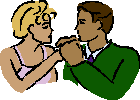 "I
will always
love you."
"I
will always
love you."
 "I
will solve all the problems of this
city."
"I
will solve all the problems of this
city."
c) Just-made
decisions: When we decide to do something at the
moment of speaking.
 "I'll have an orange
juice."
"I'll have an orange
juice."
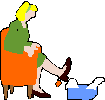 "I'll
take these ones."
"I'll
take these ones."
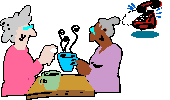 "I'll
answer it."
"I'll
answer it."
d) Offers
 -
"It's too
dark." - "I'll switch on the
light".
-
"It's too
dark." - "I'll switch on the
light".
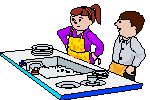 -
"I have to wash the
dishes." -"I'll help you."
-
"I have to wash the
dishes." -"I'll help you."
 "I'll
give Mr Jones your message."
"I'll
give Mr Jones your message."
e) Requests:
Will you help me,
please?
f) Refusals:
He won't stay.
g) promises:
I will be careful, I
promise.
h) threats:
Stop making that noise
or
I'll scream!
b) be going to +
infinitive
|
AFFIRMATIVE
Subject
+ am / are / is
going to + verb
I am going to work
you are going to work
he is going to work
she is going to work
it is going to work
we are going to work
you are going to work
they are going to work |
NEGATIVE
Subject
+ am not / aren't / isn't
going to + verb
I am not going to work
you aren't going to work
he isn't going to work
she isn't going to work
it isn't going to work
we aren't going to work
you aren't going to work
they aren't going to work |
INTERROGATIVE
am /
are / is + Subject +
going to + verb
am I going to work?
are you going to work?
is he going to work?
is she going to work?
is it going to work?
are we going to work?
are you going to work?
are they going to work?
|
Expressing
the future with be going to + infinitive
We use am / are / is
going to + infinitive to express:
a) Intention
It expresses the subject's intention to
perform a certain future action. This intention is always premeditated
and there is usually also the idea that some preparation for the action
has already been made. Actions expressed by this form are considered
likely to
be performed. (Will
+ infinitive expresses only intention, usually
unpremeditated.)
 "I
am going to have a
shower."
"I
am going to have a
shower."
 "I
am going to recycle this
glass."
"I
am going to recycle this
glass."
b) Prediction
of something evident
Immediate and evident consequence of
a present situation. It implies that there are signs that something
will happen.
 Look
at those clouds! It's going to rain!
Look
at those clouds! It's going to rain!
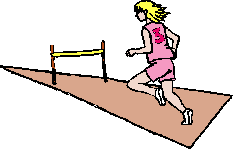 She
is going to win!
She
is going to win!
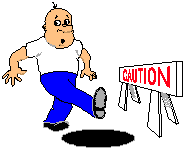 He
is going to fall!
He
is going to fall!
COMPARISON OF THE USE OF BE GOING TO AND WILL + INFINITIVE
TO EXPRESS INTENTION
The be going to
+
infinitive form always implies a premeditated intention, and often an
intention + plan.
Will +
infin. implies intention alone, and this intention is
usually, though not necessarily, unpremeditated.
If preparations for the action
have been made, we must use be
going to:
I have bought some
bricks and I'm going to build a garage.
If the intention is clearly unpremeditated,
we must use will:
—There is somebody at
the hall door.
—I'll go and open it.
When the intention is neither clearly
premeditated nor clearly unpremeditated, either form may be used:
I will / am going to climb that mountain one day.
I won't / am not going to tell you my age.
But will
is the best way of
expressing determination:
I will help you. (with stress on will. This means ‘I definitely
intend to help you’)
Compare:
a) 1- "Don't climb up
that tree, you'll
fall and hurt yourself!" (still standing on the ground)
b) 1- "Look out! You're
going to
fall!" (After climbing up the tree)
c) 2- "What shall I do
tomorrow? I
know! I'll paint the kitchen. (decided at the moment of
speaking)
d) 2- "Why are you
putting on those
clothes?" —"I'm going to paint the kitchen." (you had
already
decided)
NOTE ALSO:
1. It is not very usual to put the verbs go
and come
into the be going to
form. Instead, we generally
use the present continuous tense, i.e., instead of
I am going to go
we normally say
I am going
and instead of
I am going to come
we very often say
I'm coming.
2. Be going to
can be used with time
clauses when we wish to emphasize the subject's intention, although the
future
simple is used with time clauses.
He is going to be a dentist when he grows up.
3. Be going to
can be used without a
time expression. It then usually refers to the immediate or near
future.
I'm going to play a Bach fugue.
c) the present
continuous
|
AFFIRMATIVE
Subject + am / are / is + verb+-ing
I am working
*
you are working
he is working
she is working
it is working
we are working
you are working
they are working |
NEGATIVE
Subject + am not / aren't / isn't
+ verb+-ing
I am not working
you aren't
working
he isn't working
she isn't
working
it isn't working
we aren't
working
you aren't
working
they aren't
working |
INTERROGATIVE
am / are / is + Subject
+ verb+-ing
am I working?
are you working?
is he working?
is she working?
is it working?
are we working?
are you working?
are they working? |
Expressing the future with
the present continuous
When this tense is used with future meaning,
the time must be mentioned or have been mentioned. It
expresses a definite arrangement in the near
future. It is the sort of future events that you might put in your
diary.
The match is starting at
2.30 tomorrow.
Note: be going to
can be used for the
near future with a time expression as alternative to the present
continuous:
I'm meeting Tom at the station at six.
I'm going to meet Tom at the station at six.
But the first one implies an arrangement
with Tom, whereas the second one doesn't (Tom may get a surprise!)
We never use the Present Continuous to make
predictions about the future.
It's
going to rain / It will rain tomorrow.
 but
not: It's
raining
tomorrow!!
but
not: It's
raining
tomorrow!!
AFFIRMATIVE
Subject + verb (+ s / es)
I work
you work
he works *
she works *
it works *
we work
you work
they work |
NEGATIVE
Subject + do(es)n't +
infinitive
I don't work
you don't work
he doesn't
work
she doesn't
work
it doesn't
work
we don't work
you don't work
they don't work |
INTERROGATIVE
Do(es) + subject +
infinitive
Do I work?
Do you work?
Does he work?
Does she work?
Does it work?
Do we work?
Do you work?
Do they work? |
Expressing the future with
the present simple
This tense must also be accompanied by a
time adverbial or other similar construction.
Uses:
1. Future events which are part of a fixed
timetable or programme.
What time does the film start tomorrow evening?
For example:
Statements about the
calendar:
Tomorrow is Thursday. School
finishes on 1 July.
When something has been
planned and predetermined, especially plans for a journey or a fixed
event:
The plane takes off at 20.30.
2. In conditionals of Type 1 (after the
expressions: if, unless, as/so long as, provided/providing that):
We'll go to the beach if the weather is nice.
3. In clauses of time (after the expressions: when,
while, as soon as, after, before, until).
We won't go out until it stops raining.
OTHER FUTURE TENSES:
FUTURE CONTINUOUS: will BE + infinitive
|
AFFIRMATIVE
Subject
+ will be + v-ing
I will be working
you will be work
he will be work
she will be work
it will be work
we will be work
you will be work
they will be work |
NEGATIVE
Subject
+ will not / won't be + v-ing
I will not / won't be working
you will not / won't be working
he will not / won't be working
she will not / won't be working
it will not / won't be working
we will not / won't be working
you will not / won't be working
they will not / won't be working |
INTERROGATIVE
will + subject
+ be + v-ing
will
I be working?
will
you be working?
will he be working?
will
she be working?
will
it be working?
will
we be working?
will
you be working?
will
they be working? |
Example: At this time tomorrow, I will be flying to Madrid.
future perfect: will HAVE + PARTICIPLE
|
AFFIRMATIVE
Subject
+ will have + participle
I will have worked
you will have worked
he will have worked
she will have worked
it will have worked
we will have worked
you will have worked
they will have worked |
NEGATIVE
Subject
+ will not / won't have + participle
I will not / won't have worked
you will not / won't have worked
he will not / won't have worked
she will not / won't have worked
it will not / won't have worked
we will not / won't have worked
you will not / won't have worked
they will not / won't have worked |
INTERROGATIVE
will + subject
+ have + participle
will
I have worked?
will
you have worked?
will he have worked?
will
she have worked?
will
it have worked?
will
we have worked?
will
you have worked?
will
they have worked? |
Example:

Mrs Smith is pregnant now. She will have her child in August. By September,
she will have had her baby.

We are flying to Los Angeles now. The plane is arriving in Los Angeles at
10.45. By 11 o'clock we will have arrived in Los Angeles.
Modal
verbs: can, could, must, have to, should
Some modal verbs in English:
a) can
b) could
c) must
d) have to
e) should
AFFIRMATIVE
Subject + can + infinitive
I can ...
you can ...
he can ...
she can ...
it can ...
we can ...
you can ...
they can ... |
NEGATIVE
Subject + can't / cannot + infinitive
I can't / cannot ...
you can't / cannot ...
he can't / cannot ...
she can't / cannot ...
it can't / cannot ...
we can't / cannot ...
you can't / cannot ...
they can't / cannot ... |
INTERROGATIVE
Can + subject + infinitive
Can
I ...?
Can you ...?
Can he ...?
Can she ...?
Can it ...?
Can we ...?
Can you ...?
Can they ...? |
NOTE
Can
is usually followed by a verb in the infinitive.
USES
OF can
a) Possibility
in the present
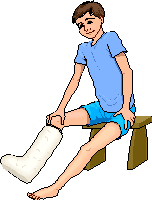 He
can't walk right now.
He
can't walk right now.
b) Permission
in the present
 "Can
I come in, please?"
"Can
I come in, please?"
c) Ability in
the present
 She can play the piano.
She can play the piano.
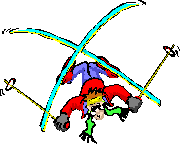 He can't ski.
He can't ski.
 He
can't see.
He
can't see.
 He
can't hear.
He
can't hear.
AFFIRMATIVE
Subject + could + infinitive
I could ...
you could ...
he could ...
she could ...
it could ...
we could ...
you could ...
they could ... |
NEGATIVE
Subject + couldn't / could not + infinitive
I couldn't / could not ...
you couldn't / could not ...
he couldn't / could not ...
she couldn't / could not ...
it couldn't / could not ...
we couldn't / could not ...
you couldn't / could not ...
they couldn't / could not ... |
INTERROGATIVE
Could + subject + infinitive
Could I ...?
Could you ...?
Could he ...?
Could she ...?
Could it ...?
Could we ...?
Could you ...?
Could they ...? |
NOTE
Could is usually followed by a verb in the infinitive.
USES
OF could
a) Possibility
in the past
 I
couldn't sleep last night.
I
couldn't sleep last night.
b) Permission
in the past
 I
couldn't go out until late when I was
young.
I
couldn't go out until late when I was
young.
c) Ability in
the past
 This
is Mrs Jones. She is 80 years
old now.
This
is Mrs Jones. She is 80 years
old now.
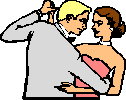 Mrs Jones could dance very well
when
she was young.
Mrs Jones could dance very well
when
she was young.
AFFIRMATIVE
Subject + must + infinitive
I must ...
you must ...
he must ...
she must ...
it must ...
we must ...
you must ...
they must ... |
NEGATIVE
Subject + mustn't/must not + infinitive
I mustn't / must not ...
you mustn't / must not ...
he mustn't / must not ...
she mustn't / must not ...
it mustn't / must not ...
we mustn't / must not ...
you mustn't / must not ...
they mustn't / must not ... |
INTERROGATIVE
Must + subject + infinitive
Must I ...?
Must you ...?
Must he ...?
Must she...?
Must it ...?
Must we ...?
Must you ...?
Must they ...? |
NOTE
Must and mustn't are usually followed by a verb in the
infinitive.
USE
OF must
Must
expresses obligation
in the present and in the past.
 You
must stop here.
You
must stop here.
USE
OF mustn't
Mustn't expresses prohibition
in the present and in the past.
 You
mustn't smoke here.
You
mustn't smoke here.
NOTE: Be careful with the spelling of "mustn't"!
AFFIRMATIVE
Subject + have / has to + infinitive
I have to ...
you have to ...
he has to ...
she has to ...
it has to ...
we have to ...
you have to ...
they have to ... |
NEGATIVE
Subject + do(es)n't have to +
infinitive
I don't have to ...
you don't have to
...
he doesn't
have to ...
she doesn't
have to ...
it doesn't
have to ...
we don't have to
...
you don't have to
...
they don't have to
... |
INTERROGATIVE
Do(es) + subject +
have to + infinitive
Do
I have to ...?
Do you have to ...?
Does he have to ...?
Does she have to ...?
Does it have to ...?
Do we have to ...?
Do you have to ...?
Do they have to ...? |
NOTE
-Have to is
usually followed by a verb in the infinitive.
USE
OF have to
IN THE AFFIRMATIVE
We use have to
to express obligation.
It is similar to must.
 I have to do my homework. ->
This is an obligation for me.
I have to do my homework. ->
This is an obligation for me.
This is similar to:
I must do my homework.
IN THE NEGATIVE
We use don't / doesn't
have to to express absence of obligation
(no obligation). This verb does not express prohibition.

I don't have to do any
housework. -> This is not an obligation for
me. I can do it if I want to.
This is very
different from: I
mustn't do my homework. (= It is a prohibition).
AFFIRMATIVE
Subject + should + infinitive
I should ...
you should ...
he should ...
she should ...
it should ...
we should ...
you should ...
they should ... |
NEGATIVE
Subject + shouldn't / should not +
infinitive
I shouldn't / should not ...
you shouldn't / should not ...
he shouldn't / should not ...
she shouldn't / should not ...
it shouldn't / should not ...
we shouldn't / should not ...
you shouldn't / should not ...
you shouldn't / should not ... |
INTERROGATIVE
Should + subject +
infinitive
Should I ...?
Should you ...?
Should he ...?
Should she ...?
Should it ...?
Should we ...?
Should you ...?
Should they ...? |
NOTE
Should is usually followed by a verb in the infinitive.
USE
OF should
We use should to express advice
or
suggestion, convenience to do something. It does not
express
obligation.
 She
is too fat.
She
is too fat.  She should
take exercise.
She should
take exercise.
Conditional
sentences
1.
TYPE 1: Real conditionals
IF + Subject +
Present Simple // Subject +
Future (= will +
infinitive)
Examples: If he comes, I will be happy.
If he comes, I won't stay at home.
If he doesn't come, I will be sad.
If you don't call me, I won't call you.
If he needs it, will you help him?
Note that the if-clause
can also appear after the main clause:
I will be happy if he comes.
2.
TYPE 2: Unreal or hypothetical conditionals
IF + Subject +
Past Simple // Subject +
Conditional (= would +
infinitive)
Examples: If
he came, I would be happy.
If he came, I wouldn't stay at home.
If he didn't come, I would be sad.
If you didn't call me, I wouldn't call you.
If he needed it, would you help him?
Note that the if-clause
can also appear after the main clause:
I would be happy if he came
3.
TYPE 3: Impossible conditionals
IF +
Subject +
Past Perfect // Subject + Conditional
Perfect
Examples: If he had studied, he would have
passed the
exam. (= he didn't study, so he
didn't pass the exam.)
If he had studied, he
wouldn't have failed the exam. (=he didn't
study, so he failed the exam.)
If he hadn't helped me,
I wouldn't have achieved it. (He helped me, so
I achieved it.)
If you hadn't called me, I wouldn't have known.
If he had called you, would you have helped him?
Note that the if-clause
can also appear after the main clause:
I would have gone to New York if I had had the money.
4. Unless
unless = if not
"Unless" is a conditional and
negative particle. It can replace "if" and the negation of the verb.
"Unless" can be used with conditional
of type 1, type 2, and type 3.
Examples:
I won't do the work if they don't pay me. = I won't do the work
unless they pay me. (type 1)
If he doesn't study, he won't learn the language. = Unless
he studies, he won't learn the language. (type 1)
I wouldn't call you if you didn't call me. = I wouldn't call you unless you
called me. (type 2)
If you hadn't called me, I wouldn't have known. = Unless you had called me, I
wouldn't have known. (tp. 3)
Infinitive
and gerund
Infinitives, to
+ infinitive, and gerunds (verb+-ing)
are used in English in the following cases:
a) after certain verbs
+
infinitive
MODAL VERBS:
can / can't
could / couldn't
must / mustn't
should / shouldn't
may / mayn't
might / mightn't
OTHER VERBS
make
let
would rather
had better
|
+
to infinitive
agree
aim
allow
appear
arrange
ask
attempt
beg
begin*
bother
care
can't afford
cease*
choose
claim
consent
continue*
decide
decline
demand
determine
encourage
expect
fail
forget
guarantee
happen
have
help
hesitate
hope
intend
invite |
learn
long
manage
mean
neglect
offer
plan
prepare
pretend
promise
prove
persuade
refuse
remind
request
resolve
seem
start*
swear
teach
tend
threaten
used (habit)
volunteer
vow
want
warn
wish
would like
would love
would hate
would prefer |
|
+
gerund
admit
avoid
be worth
begin*
enjoy
can't bear
can't help
can't stand
cease*
continue*
deny
dislike
don't mind
enjoy
fancy
feel like
finish
give up
imagine
involve
hate
keep
like
practise
resent
resist
risk
start*
stop
suggest
AFTER
PREPOSITIONS
WITH VERBS AS
SUBJECTS
WITH ACTIVities |
When
another verb
follows one of these verbs,
the second verb must be in the infinitive,
or to +
infinitive, or a gerund (verb + -ing).
Look at these examples:
I
can dance very well.
I
want to dance
with you.
I
love dancing.
We must follow the rules in the list.
Sometimes, a verb has got two
possibilities. They are both correct, and they have the same meaning.
These verb have got a star (*). Look at these examples:
I
began to dance. = I began dancing.
I
started to laugh. = I started laughing.
I
continued to work with you. = I continued working.
It
ceased to rain. = It ceased raining.
Sometimes, a verb has got two
possibilities, but they have a different meaning.
Look at these
examples:
I
stopped to speak. (I was doing something else, and then I
stopped
this activity and started to speak.)
but: I stopped speaking.
(I was speaking, and then I stopped this
activity.)
I
remembered to bring the camera. (I wanted to bring the
camera. I
remembered this, so I brought it.)
but: I
remember closing the door. (I closed the door.
Now I remember I did this.)
I
mean to be the best in my class. (= I am determined to be
the
best. I have this intention.)
but: You can be the
best, but that means working hard. (= This implies
that you have to work hard.).
b) after a preposition
After a
preposition, we use the gerund. Look at these examples:
I
am tired of working.
I
am interested in buying
a house.
He
is good at singing.
He left without talking
to me.
c) verb as subject
When the verb is
the subject of the sentence, we usually use the gerund. Look at these
examples:
Smoking is bad for
you health.
I
think that reading
is one of the most interesting things to do.
Driving dangerously
can cause you a lot of problems.
The
passive voice
AFFIRMATIVE
Subject + am / are / is
+ participle
I am loved
you are
loved
he is loved
she is loved
it is loved
we are loved
you are
loved
they are
loved |
NEGATIVE
Subject + am not/ aren't / isn't
+ participle
I am not
loved
you aren't
loved
he isn't
loved
she isn't
loved
it isn't
loved
we aren't
loved
you aren't
loved
they aren't
loved |
INTERROGATIVE
am / are / is + Subject
+ participle
am
I
loved?
are
you loved?
is he
loved?
is she
loved?
is it
loved?
are we
loved?
are
you loved?
are they
loved? |
AFFIRMATIVE
Subject + was / were +
participle
I was loved
you were loved
he was loved
she was loved
it was loved
we were
loved
you were
loved
they were
loved |
NEGATIVE
Subject + wasn't / weren't
+ participle
I wasn't
loved
you weren't
loved
he wasn't
loved
she wasn't
loved
it wasn't
loved
we weren't
loved
you weren't
loved
they weren't
loved |
INTERROGATIVE
was / were + Subject
+ participle
was
I loved?
were
you loved?
was he
loved?
was
she loved?
was it
loved?
were
we loved?
were
you loved?
were
they loved? |
NOTE
The Passive voice is expressed with the verb
BE and the participle. The tense (Present Simple, Present Continuous,
Present Perfect, Past Simple, etc.) is expressed in the verb BE.
To see more information about the participle click
here.
CONVERSION
FROM ACTIVE SENTENCES INTO
PASSIVE SENTENCES
Active sentences usually have a subject, a
verb, and direct object and/or an indirect object:
He gave me the
money. (subject, verb, indirect object,
direct object)
In the passive sentence, the
direct
object becomes the subject.
The money was given to
me.
And in English, the
indirect object can
also become the subject.
I was given the money.
Finally, the subject of the active sentence
becomes the agent, and is introduced with by:
The money was given to me by him.
I was given the money by him.
Note that after by,
we use object pronouns
(me, you, him, her, it,
us, you, them).
USE
OF THE PASSIVE VOICE
In English, the passive voice is very usual,
more usual than, for example, in Spanish. It is used whenever we don't
want to
mention the subject because it is not important, or because we don't
know it. The emphasis in on the action and not on the person or object
who does it.
 A
lot of toxic chemicals are spilt in the river.
A
lot of toxic chemicals are spilt in the river.
other
passive tenses:
AFFIRMATIVE
Subject + am / are / is being
+ participle
I am being loved
you are being loved
he is being loved
she is being
loved
it is being loved
we are being loved
you are being loved
they are being loved |
NEGATIVE
Subject + am not/ aren't / isn't being
+ participle
I am not being
loved
you aren't being loved
he isn't being loved
she isn't being
loved
it isn't being
loved
we aren't being
loved
you aren't being
loved
they aren't being
loved |
INTERROGATIVE
am / are / is + Subject being
+ participle
am being
I
loved?
are being
you loved?
is being
he loved?
is being
she loved?
is being
it loved?
are being
we loved?
are being
you loved?
are being they
loved? |
AFFIRMATIVE
Subject + was / were being
+ participle
I was being loved
you were being loved
he was being loved
she was being
loved
it was being loved
we were being loved
you were being loved
they were being loved |
NEGATIVE
Subject + wasn't / weren't being
+ participle
I wasn't being
loved
you weren't
being loved
he wasn't being loved
she wasn't being
loved
it wasn't being
loved
we weren't being
loved
you weren't being
loved
they weren't being
loved |
INTERROGATIVE
was / were + Subject being
+ participle
was I
being
loved?
were you
being loved?
was he being loved?
was she being loved?
was it being loved?
were we being loved?
were you being loved?
were they being loved? |
AFFIRMATIVE
Subject + have / has been
+ participle
I have been loved
you have been loved
he has been loved
she has been loved
it has been loved
we have been loved
you have been loved
they have been loved |
NEGATIVE
Subject + haven't / hasn't been
+ participle
I haven't been loved
you haven't been
loved
he hasn't been loved
she hasn't been loved
it hasn't been loved
we haven't been loved
you haven't been
loved
they haven't
been loved |
INTERROGATIVE
has / have + Subject been
+ participle
have I been loved?
have you been loved?
has
he been loved?
has
she been loved?
has it been loved?
have we been loved?
have you been loved?
have they been loved? |
AFFIRMATIVE
Subject + had been + participle
I had been loved
you had been loved
he had been loved
she had been loved
it had been loved
we had been loved
you had been loved
they had been loved |
NEGATIVE
Subject + hadn't been + participle
I hadn't been loved
you hadn't been loved
he hadn't been loved
she hadn't been loved
it hadn't been loved
we hadn't been loved
you hadn't been loved
they hadn't been
loved |
INTERROGATIVE
had + Subject been + participle
had I been loved?
had you been loved?
had
he been loved?
had
she been loved?
had it been loved?
had we been loved?
had you been loved?
had
they been loved? |
AFFIRMATIVE
Subject + will be + participle
I will be loved
you will be loved
he will be
loved
she will be
loved
it will be
loved
we will be
loved
you will be
loved
they will be
loved |
NEGATIVE
Subject + will be + participle
I will be
loved
you will be loved
he will be
loved
she will be
loved
it will be
loved
we will be
loved
you will be
loved
they will be
loved |
INTERROGATIVE
will be + Subject + participle
will I
be
loved?
will you
be
loved?
will he be loved?
will she be loved?
will it be loved?
will we be loved?
will you be loved?
will
they be
loved? |
AFFIRMATIVE
Subject + am / are / is
going to be + participle
I am going to be loved
you are going to be loved
he is going to be loved
she is going to be loved
it is going to be loved
we are going to beloved
you are going to be loved
they are going to be loved |
NEGATIVE
Subject + am not/ aren't / isn't
going to be + participle
I am not going to be loved
you aren't going to be loved
he isn't going to be loved
she isn't going to be loved
it isn't going to be loved
we aren't going to be loved
you aren't going to be
loved
they aren't going to be
loved |
INTERROGATIVE
am / are / is + Subject
going to be + participle
am I
going to be loved?
are you going to be loved?
is he going to be loved?
is she going to be loved?
is it going to be loved?
are we going to be loved?
are you going to be loved?
are they going to be loved? |
2002 - 2014 © Montse Morales


 grammar
reference
grammar
reference I
I
 you
you
 he
he
 she
she it
it  it
it we
we
 you
you
 they
they

 they
they

 they
they me
me
 you
you
 him
him
 her
her it
it  it
it us
us
 you
you
 them
them 
 them
them

 them
them friends.
friends.
 my
my
 your
your
 his
his
 her
her its
its
 its
its our
our
 your
your
 their
their 
 their
their

 their
their mine
mine
 yours
yours
 his
his
 hers
hers its
its
 its
its ours
ours
 yours
yours
 theirs
theirs 
 theirs
theirs

 theirs
theirs one
book
one
book  two books
two books

 one
apple
one
apple 
 two
apples
two
apples
 one
boy
one
boy  two
boys
two
boys
 one
bus
one
bus 
 two
buses
two
buses
 one
brush
one
brush 
 two brushes
two brushes
 one
church
one
church 
 two churches
two churches
 one
box
one
box 
 two boxes
two boxes
 one
tomato
one
tomato 
 two tomatoes
two tomatoes
 one
baby
one
baby 
 two babies
two babies
 one
wolf
one
wolf 
 two wolves
two wolves
 one
knife
one
knife 
 two knives
two knives
 one
shelf
one
shelf 
 two shelves
two shelves
![]() one
life
one
life
![]()
![]() two lives
two lives
![]() one
housewife
one
housewife ![]()
two housewives
 one
foot
one
foot  two feet
two feet
 one
tooth
one
tooth  a lot of teeth
a lot of teeth
 one
woman
one
woman 
 two women
two women
 one
man
one
man 
 two men
two men
 one
child
one
child  two children
two children
 one
person
one
person
 a lot of people
a lot of people
![]() one
mouse
one
mouse
![]()
![]() two mice
two mice
 one
goose
one
goose 
 two
geese
two
geese
![]() one
louse
one
louse ![]()
![]() two
lice
two
lice
 one
sheep
one
sheep

 two sheep
two sheep
![]() one
fish
one
fish
![]()
![]() two
fish
two
fish
A presentation: Countable or
uncountable?
![]() There is an
apple. There
isn't an
egg. Is there an orange?
There is an
apple. There
isn't an
egg. Is there an orange?![]() There is a pear. There
isn't a melon. Is
there a tomato?
There is a pear. There
isn't a melon. Is
there a tomato?![]() There are some books on
the shelf.
There are some books on
the shelf.  There is some food in the basket.
There is some food in the basket.![]() There aren't any books on the
shelf. Are there any books on the shelf?
There aren't any books on the
shelf. Are there any books on the shelf? There isn't any food in the
basket. Is there any food in the basket?
There isn't any food in the
basket. Is there any food in the basket?













 He is
tall.
He is
tall.
 He is happy.
He is happy.
 It
is dark.
It
is dark.  I
am hungry.
I
am hungry. He is a teacher.
He is a teacher.
 They are at school.
They are at school.
 She is two years old.
She is two years old. The
weather is cold in the winter.
The
weather is cold in the winter.  It
is warm and sunny today.
It
is warm and sunny today. She
has got long hair.
She
has got long hair.  She hasn't got long hair.
She hasn't got long hair.
 They
have got presents.
They
have got presents.
 He hasn't got a guitar.
He hasn't got a guitar. I
don't usually walk to work.
I usually drive my car
to work.
I
don't usually walk to work.
I usually drive my car
to work.
 I
live in a big city.
I
live in a big city. I
like the cinema.
I
like the cinema.
 I
don't like
vegetables.
I
don't like
vegetables.
 The sun rises in the East.
The sun rises in the East.  He is drinking (now).
He is drinking (now).  She
is writing an important scientific article.
She
is writing an important scientific article. She usually drives to work, but
today she's going by bus.
(She's not on the bus
right now. We are expressing an exception to her habit.)
She usually drives to work, but
today she's going by bus.
(She's not on the bus
right now. We are expressing an exception to her habit.) Our friend John is living with
us this month.
(He does not live with
us, it is only for this month.)
Our friend John is living with
us this month.
(He does not live with
us, it is only for this month.) He is a teacher.
-Does he
correct exams? -Yes, he does. He corrects
exams
because this is part of his job.
We use the Present Simple for
habits.
-Is
he correcting exams? -No, he isn't. He is teaching a
lesson.
He is a teacher.
-Does he
correct exams? -Yes, he does. He corrects
exams
because this is part of his job.
We use the Present Simple for
habits.
-Is
he correcting exams? -No, he isn't. He is teaching a
lesson.
 He is a baker.
-Does
he make bread? -Yes, he does. -Is he making bread? -Yes, he
is.
-Does he make cakes? -Yes, he does. -Is he making a cake?
-No, he isn't.
-Does he make shoes? -No, he doesn't.
He is a baker.
-Does
he make bread? -Yes, he does. -Is he making bread? -Yes, he
is.
-Does he make cakes? -Yes, he does. -Is he making a cake?
-No, he isn't.
-Does he make shoes? -No, he doesn't.


 Mmm,
this rose smells very nice.
Mmm,
this rose smells very nice. I'm very hungry. I want to eat.
I'm very hungry. I want to eat. I don't like vegetables.
I don't like vegetables. Now
I understand the problem!
Now
I understand the problem! He
has a lot of money.
He
has a lot of money. He
is having a bath.
He
is having a bath.
 There
is one apple.
There
is one apple.
 There
is a woman.
There
is a woman.
 There is some tea.
There is some tea.

 There are two apples.
There are two apples.
 There
are a lot of people.
There
are a lot of people.
 There
was an accident yesterday.
There
was an accident yesterday.
 There
was a woman.
There
was a woman.
 There
was some tea.
There
was some tea.

 There were two apples.
There were two apples.
 There were a lot of people.
There were a lot of people.
 Shakespeare was a
writer. He was born in England in 1564. He wrote a lot of theatre
plays and poems. He died in 1616. He was a contemporary of
Cervantes, but most probably he didn't know him or his writings.
Shakespeare was a
writer. He was born in England in 1564. He wrote a lot of theatre
plays and poems. He died in 1616. He was a contemporary of
Cervantes, but most probably he didn't know him or his writings.
 We often went to the beach.
We often went to the beach.
 When
I was a child, I
used to have long hair.
When
I was a child, I
used to have long hair.
 Yesterday at 8.30 they were
having breakfast.
Yesterday at 8.30 they were
having breakfast. Yesterday while the children
were playing in the park, Sally was reading.
Yesterday while the children
were playing in the park, Sally was reading.
 When I was watching TV,
the
telephone rang.
When I was watching TV,
the
telephone rang.

 He is eating an apple (now).
He is eating an apple (now). She
has eaten an
apple.
She
has eaten an
apple.
 She
is climbing
a mountain (now).
She
is climbing
a mountain (now). They
have climbed
a mountain.
They
have climbed
a mountain. She
has finished
her work.
She
has finished
her work.
 She hasn't finished her
work. (And she's still working.)
She hasn't finished her
work. (And she's still working.) Tom
has had an
accident. (And now he has got a
broken leg.)
Tom
has had an
accident. (And now he has got a
broken leg.) I
have always had good marks.
I
have always had good marks. I
have travelled
to many countries.
I
have travelled
to many countries. Shakespeare
wrote a lot of plays and poems.
Shakespeare
wrote a lot of plays and poems. He has never played
computer games.
He has never played
computer games.
 Have you ever visited Rome?
Have you ever visited Rome?
 It is the best film I have ever seen.
It is the best film I have ever seen. He hasn't ever walked. = He has never walked.
He hasn't ever walked. = He has never walked. Have you made your bed yet?
Have you made your bed yet?
 She hasn't had her baby yet.
She hasn't had her baby yet.
 She has already had her baby.
She has already had her baby.
 They have just married.
They have just married.
 I haven't seen the dentist for
one year.
I haven't seen the dentist for
one year.
 I
haven't ridden my bicycle since
last month.
I
haven't ridden my bicycle since
last month.
 I am exhausted because I have been cleaning all day.
I am exhausted because I have been cleaning all day. She is fit because she has been working out lately.
She is fit because she has been working out lately. Yesterday
by 12 o'clock I had gone to sleep. (= I went
to sleep before 12 o'clock.)
Yesterday
by 12 o'clock I had gone to sleep. (= I went
to sleep before 12 o'clock.)

 After they had got married, they
travelled to Rome. (= They got
married and then they travelled to Rome.)
After they had got married, they
travelled to Rome. (= They got
married and then they travelled to Rome.)
 He couldn't answer the questions
because he hadn't revised.
He couldn't answer the questions
because he hadn't revised. She was bored because she had been doing nothing all day.
She was bored because she had been doing nothing all day. The land was dry because the sun had been shining for days.
The land was dry because the sun had been shining for days. "You'll
marry a
rich man."
"You'll
marry a
rich man."  "Tomorrow
will be a sunny
day."
"Tomorrow
will be a sunny
day." "I
will always
love you."
"I
will always
love you."
 "I
will solve all the problems of this
city."
"I
will solve all the problems of this
city."
 "I'll have an orange
juice."
"I'll have an orange
juice."  "I'll
take these ones."
"I'll
take these ones."
 "I'll
answer it."
"I'll
answer it."
 -
"It's too
dark." - "I'll switch on the
light".
-
"It's too
dark." - "I'll switch on the
light".
 -
"I have to wash the
dishes." -"I'll help you."
-
"I have to wash the
dishes." -"I'll help you."
 "I'll
give Mr Jones your message."
"I'll
give Mr Jones your message."
 "I
am going to have a
shower."
"I
am going to have a
shower."
 "I
am going to recycle this
glass."
"I
am going to recycle this
glass." Look
at those clouds! It's going to rain!
Look
at those clouds! It's going to rain!  She
is going to win!
She
is going to win! He
is going to fall!
He
is going to fall!


 He
can't walk right now.
He
can't walk right now.
 "Can
I come in, please?"
"Can
I come in, please?"
 She can play the piano.
She can play the piano.
 He can't ski.
He can't ski.
 He
can't see.
He
can't see.
 He
can't hear.
He
can't hear. I
couldn't sleep last night.
I
couldn't sleep last night.
 I
couldn't go out until late when I was
young.
I
couldn't go out until late when I was
young.
 This
is Mrs Jones. She is 80 years
old now.
This
is Mrs Jones. She is 80 years
old now.  Mrs Jones could dance very well
when
she was young.
Mrs Jones could dance very well
when
she was young. You
must stop here.
You
must stop here.
 You
mustn't smoke here.
You
mustn't smoke here. I have to do my homework. ->
This is an obligation for me.
I have to do my homework. ->
This is an obligation for me.

 She
is too fat.
She
is too fat.  She should
take exercise.
She should
take exercise.  A
lot of toxic chemicals are spilt in the river.
A
lot of toxic chemicals are spilt in the river.